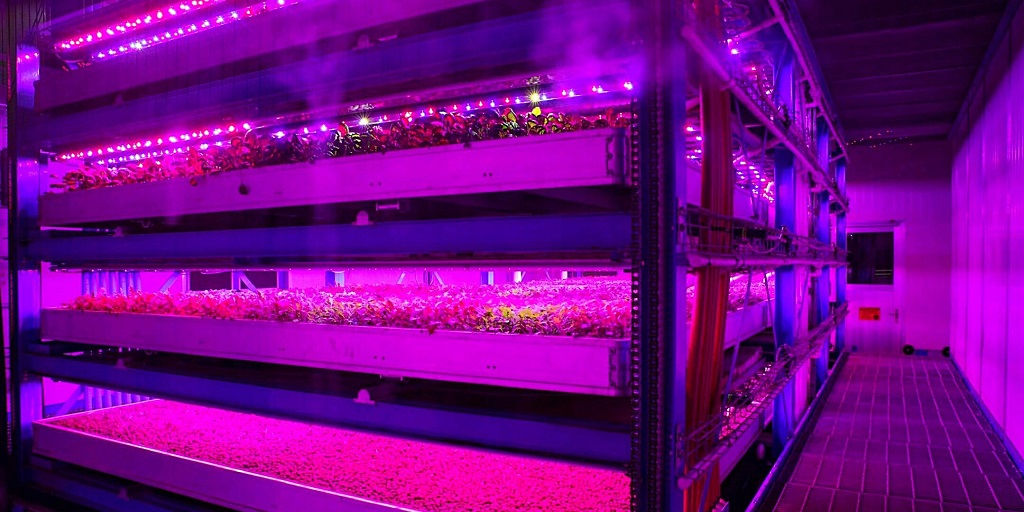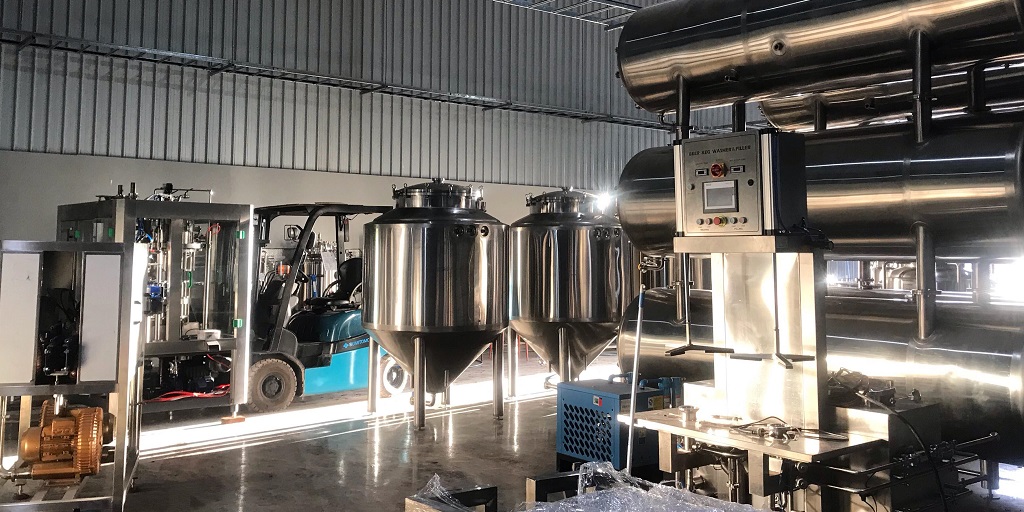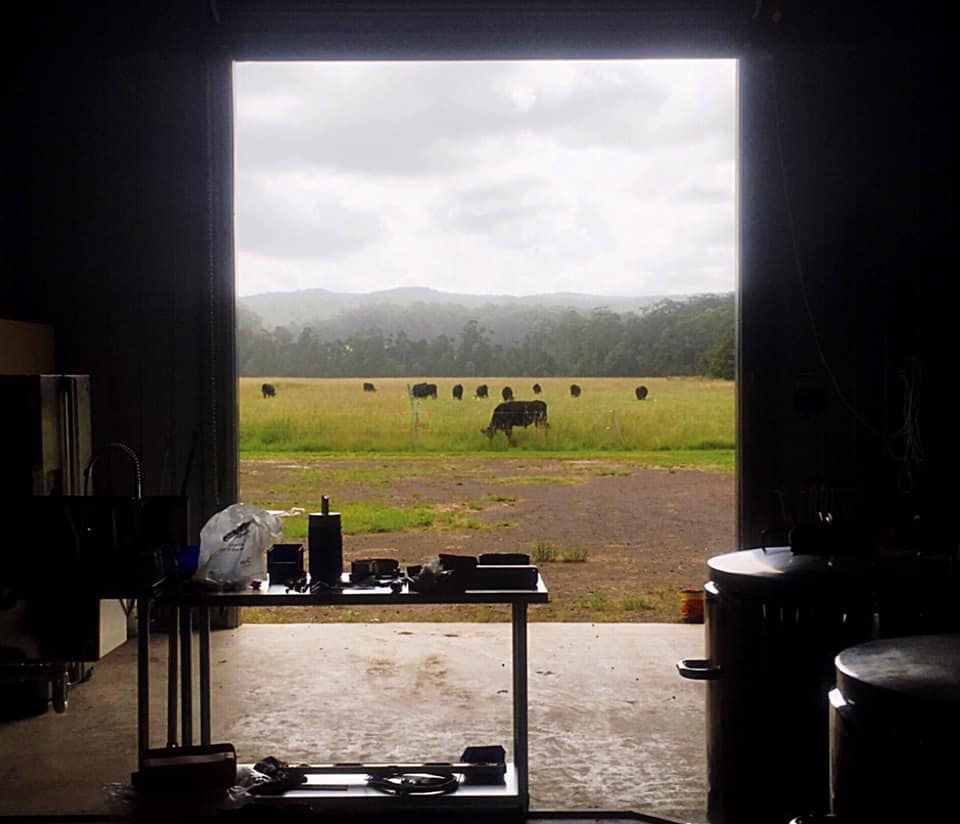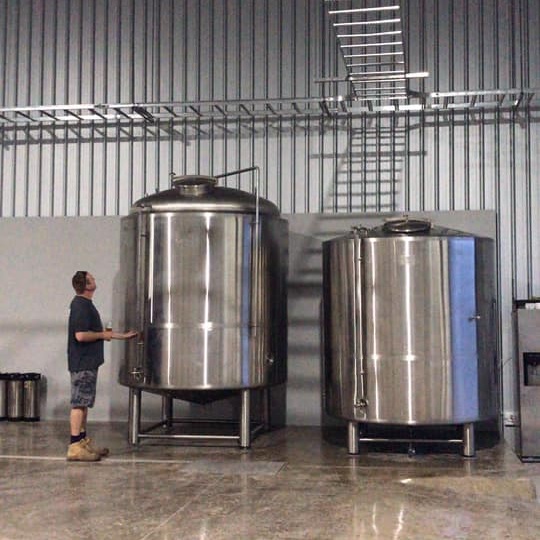
Terella Brewing experiments with sustainability on Sunshine Coast

‘Sustainability’ is an enigmatic concept, even more so in a resource-intensive industry like brewing, but it’s a challenge that the Sunshine Coast’s Terella Brewing Co is taking up wholeheartedly.
Brandt Bamford, along with long-time family friend Torren Read and farmer Ashley Thomson, are set to launch the taproom and brewery to the public this weekend, and while much work has gone into it already, Terella will be a work in progress for the foreseeable future, Bamford said.
Head brewer Bamford is a WA-born electrician who worked in the Pilbara until eight years ago, and has been homebrewing for the past decade. Operations manager Read was a boilermaker and also worked in the oil and gas industry, while Thomson is focused on the farming side of things.
Read and Bamford were family friends who grew up together, but it was only in the past two years that their dreams of turning homebrewing into a viable career came to fruition, upon a chance meeting with Thomson in October 2018.
“I’ve been brewing for 10 years, just at homebrew level, but it sort of grew and grew,” said Bamford.
“I worked my way up to the point where in the past couple of years I’ve had quite an elaborate system in my shed, much to the wife’s disgust. There was 30 grands worth of equipment in there – it got out of hand.
“So it was the usual story, my mates were saying ‘your beer is amazing you’ve got to set up a brewery’, and I said nah you’re only saying that to get free beer.”
It was a fortuitous meeting with his local greengrocer that led to the seeds of the brewery being sown.
“He delivered to me in exchange for a few homebrews, and told me about this amazing vertical farm. He said it produces water through dehumidification in a grow booth, and the farmer is looking for a water-intensive activity, so he suggested a brewery.”
The greengrocer rang him and within an hour, the farmer, Ash Thomson, was in Bamford’s shed drinking his homebrewed beer.
“Bear in mind I’m an amateur brewer I’ve got no official training, I said to him,” explained Bamford.
“But Torren, myself and Ash were all in, so we said that’s it, we’re going for it. I’m nervous as hell!”
Bamford said that the 69 acres of land outside Eumundi on which Terella is based is a fully functioning farm, which is also taking an innovative approach to sustainability.
The brewery shares a 1,800-square metre shed with a vertical farm system, which has proved a launching point for Terella’s sustainability focus.
The brewhouse
Currently Bamford is brewing on a 200L pilot plant as a proof of concept experiment, and it, along with the incoming 12hL brewhouse, was custom made with the help of a Brisbane-based engineer.
“We’re going to a 12-hec brewhouse which should be installed in the next few weeks, which we’ve custom made through China.”
The Terella team has set out to do things their own way, even when they were met with opposition.
“Like everything so far, we’ve tended to see what the industry is doing and go the opposite way.
“We’ve got to horizontal tanks instead of conical fermenters – it speeds up the process for us and also gives us a bigger yeast bed as well on settling. That allows the yeast to clean up after themselves a bit quicker.
“They are much harder to clean and maintain but it’s a bit of a sacrifice for what we think will end up as a better product.”
They are using extra wide conical fermenters which have 90 degree cones, which Bamford said allows faster fermentation.
“We’re hoping to shave a day off on fermentation, and then we will send them to our horizontals to finish off, so it’s a little bit different.”

Even when it comes to packaging, Terella is going against the grain and has invested in a bottling machine, rather than launching with cans.
“There are a couple of problems with bottling that people have identified, one is light, the other is oxygen ingress and dissolved oxygen numbers,” Bamford explained.
“While canning is good in terms of those things, with canning, especially on a fast line, it’s hard to get good dissolved oxygen numbers because they can’t double pre-evac a can.”
Bamford said they had been working on the process to address the issues usual with bottling.
“With our bottling we’re able to get better dissolved oxygen numbers through means of double pre-evac, pumping the air out of the bottle and purge with nitrogen – we’ve got a nitrogen generator on site. We do that twice and then fill with beer.”
He said canning lines cannot evacuate 100 per cent of the air or it would collapse the can.
“We went with bottles because we can get better DO numbers to start, and then we went with a jet black bottle as well to eliminate as much light as we can.
“It took us ages to sort these bottles, it was a nightmare, but they’re actually made in Australia which is really good. We got the brewhouse made overseas but were trying as hard as we can to source our products from Australia.”
Water and CO2
Initial plans for Terella were launched to integrate the brewery with the existing vertical farm system, and the team are working on connecting the two aspects while using tank water in the meantime.
“We’ve got to put in a secondary filtration system and a holding tank and other bits and pieces, so we are working on that as we speak,” Bamford explained.
Once the infrastructure is in place to use the water from the vertical farm system, it will be a major technical advantage.
“Our water, it basically contains no minerals. Very little trace elements, we use the pilsner water profile and match that water profile to the beer,” he explained.
“We’ve got some pretty cool brewing software, so we basically enter in our starting point and we can bump up chloride to sulfide ratios, or do anything we want to do to accentuate our maltiness, bitterness, or hop profile.
“Basically with every recipe we’ve tweaked the water so we get a blank canvas when we are utilising the water from the vertical farm system. Because that comes out as demineralised water with almost no trace elements.”
The site is not connected to mains water, and relies on the 2 million litres of water a year that is caught on the roof space, and the plan is to reduce as far as possible the water to beer ratio.
“The magic number seems to be about 3 litres of water to a litre of beer, and we’re hoping to get that down,” Bamford said.
“I think Yatala have got it down to about 2.6 litres, somewhere around there, so we’re going to try and figure out a couple of new ways of doing things like cleaning our vessels.”
He said ideally they would use 100 per cent of the water used for washdowns; recycling, re-filtering and reusing it, but councils will not allow it.
“You can have the most ultimate three-stage reverse osmosis filtration system but they will not let you use it. You might get away with it for flushing toilets, but obviously there are risks with a system if it doesn’t get maintained.
“We also want to irrigate the fields with that water so that’s another piece of the puzzle we’re trying to solve.”
The Terella team are attempting to do the same with the CO2, capturing it and injecting it back into the brewing process to avoid wastage wherever possible.
“The boys on the other end at the vertical farm have been busy working on the COs injection systems, so they’ve got CO2 dosing system, monitors, and been doing some trialling,” Bamford said.
“I’ve had to do the calculations on that and work out exactly how much CO2 we can produce.”
He said that in terms of cost, it works out the same as buying CO2 in, even with the cost of maintenance.
“So with us being able to capture the CO2 and reinject it for almost nothing really, because at the end of the day we’d just be letting it off, for us it’s pretty cool.”
Can a brewery really be sustainable?
Positioning a company as ‘sustainable’ is easy, but consistently trying to live up to it is much more difficult, which Bamford freely admits.
The Terella team are set to install 100kW worth of solar panels, but solar poses another challenge for a brewery, which needs consistent energy throughout the day, depending on brewing schedules.
Terella’s brewery currently runs on a generator and is not connected to the mains grid, so the solar panels can’t come soon enough, said Bamford, but they may still use the generator as a failsafe.
“We can’t be coupled to only be brewing when the sun is out. I think our model, as much as we don’t want it to, it may involve a Genset as a backup when all else fails, but we’re working hard to eliminate it as much as we can.”
They are also looking into other options for energy storage and use.
“We’ve got a few different options, including battery storage coupled with solar, that’s a real possibility for us, and then getting clever [in other areas] – we run all our cold rooms on glycol for example, so we’re looking at mass glycol storage as a battery alternative.”
The plans for glycol are hypothetical at the moment but the idea is to have a large volume of glycol stored in an insulated tank. It will be connected to an oversized glycol chiller to pull down the large glycol reserve well below daytime operating temperatures so that the chiller is running primarily from solar. Then at night the variable speed glycol chiller slows down and the large glycol reserve is used to maintain glycol loop temperatures.
“Effectively we are using the mass glycol storage as a giant battery of stored energy to reduce our over night electricity usage. Basic cost calculations indicate that it is feasible but it’s all dependent on a highly insulated glycol system,” explained co-founder Read.
Terella plans to be a farm brewery, and the team are looking at different issues in an attempt to reduce the brewery’s carbon footprint and create a more self-contained ecosystem on the farm, including feeding spent grain from the brewing process to the 30 head of Black Angus cattle on site.
Bamford said they currently get their Noble hobs from Europe, but they are working to bring hop production in house.
“It pains me to have to ship hops from the Czech Republic to the Sunshine Coast, it drives me nuts thinking about it.
“A lot of the Noble hops we import unfortunately at this stage, but we’re working hard to make it viable for us to produce our own hops on site.”
He said the team at Terella are attempting to develop a prototype to enable indoor hop growing.
“You’ve got things like Ella hops in Tasmania and places like that but they can only produce so much. The way breweries are popping up we can’t grow enough produce to sustain it.
“The craft beer scene has just blown up and that led us to working on a hop growing prototype. If we can grow hops in any part of Australia indoors, it would be a gamechanger.
“If we could grow hops here we could provide ten local breweries with hops, the hops don’t have to travel from one side of Australia to another, let alone from one side of the world to the other.”
Bamford said Terella is also looking to trial malt created by a farming cooperative three hours west of Eumundi.
“We’re hoping to partner up with the wheat and barley farmers out there who are pooling resources together and doing some malting trials.”
From utilities to ingredients, developing a sustainable business model in brewing is tricky, and at this point, Bamford said, not something they can fully realise.
“If we had our way it would be 100 per cent sustainable, but there are also constraints with what we can do.
“I’ve always had a passion for innovation and technology. If someone says to me and says “this is the way we’ve always done it” that bugs the hell out of me. There’s got to be a better, more efficient way.”
He is also embracing the collegiate culture of Australia’s breweries.
“I’m a firm believer that the high tide raises all ships and I want to show the world what were doing here in terms of how we’re brewing here – if it all works, as a lot of this is pie in the sky – but that’s where it starts isn’t it?
“If all this stuff works I want every brewery to come in and have a look, I’m happy to show everyone. If it can improve the industry as a whole it will only improve beer, everyone’s beer and we all get to benefit from that.”
The venue
While the Terella team have been focusing on the finer details of the technical process, the move to commercial brewing hasn’t been an easy one, and even for an avid homebrewer it can be a difficult transition, Bamford said.
“There’s been quite a few teething problems, it’s been a rapid learning curve from myself, trying to figure out hop utilisation and tweaking the recipes, but I’ve got a good grasp on it now.”
On the pilot system, Bamford has developed Terella’s core range which consists of a session ale standing at around 3.5% abv, a European-style lager, a hazy IPA and a mango XPA, which Bamford says seems to be the “winner” so far.
“It’s not like a full sickly sweet beer, it’s a sessionable XPA and it’s hoppy to offset the mango flavour. It’s quite popular with non-beer drinkers too.”
He said the focus on lighter offerings was a conscious decision on their part.
“It’s due to our location. We’ve got a couple of different recipes around that range because we are a little bit out of town, we don’t want a driver to have to come and only be able to pick one beer.”
Terella’s taproom will be open from this Saturday, but the brewery has bigger plans, which it is looking to roll out in stages.
“We’re really trying to become a bit of a destination, and also we don’t want to just be known as just a brewpub. We want people to come in and see what we’re doing in terms of the vertical farm system and how we’re integrated.
“We’re a fully functioning farm and have heaps of more animals coming all rescue animals – in six weeks we’ll have a petting zoo.
“I’ve got small children and so does Ash and we sat down and talked about it. Do we want to be a brewery or do we want to be something else?”
He said the Terella team want the venue to be a destination, not just a taproom, with plans to launch a full restaurant with a beer garden next year, using produce from the farm.
“Because we’ve got a big parcel of land here we’ve got loads of opportunities, we want to do a rock climbing wall and other bits and pieces,” he said.
“We want it to be somewhere where the parents say let’s go for a beer and a burger and the kids are excited to come too.
“The response from the community has been awesome, the locals are pumped about having somewhere in their setting that’s rural where they can hang out.”
Terella Brewing Co will open it’s taproom at 196 Bunya Road, 4561 North Arm, Queensland, on Saturday 9th November.
Brewery openings are presented by Spark Breweries and Distilleries, the finest in-venue and production brewing systems available, with local design and support.





